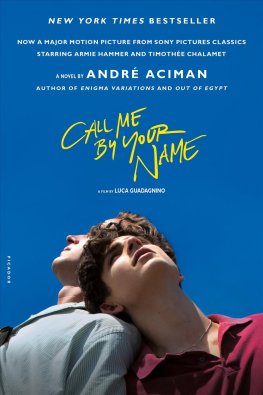This is one of the most incredible stories I have read, one which leaves me with a bittersweet aftertaste and a yearning for the continuation of Elio’s soulful narrative. Andre Aciman is gifted, who writes with emotions and then weaves those emotions like poetry. He makes that one hot summer of Elio’s youth part of ours and suddenly we are reminded of the first time we fell in love or lusted over somebody who got away. He makes us want to be Elio, walking barefoot across the sun-kissed floor and enjoying a carefree summer.
Spoilers ahead
The story begins with a seventeen-year-old Elio and ends fifteen years later. Narrated by Elio, we come across Oliver, an American doctoral student who has come to stay in Italy with Elio and his parents. At first, Elio shows his disdain for Oliver and his constant use of “later”. He finds Oliver cold, indifferent and a little arrogant. He also admits that he is social and charming with everyone he meets. His own mother affectionately calls him “la muvi star”. By comparison, Elio is introverted; preferring his books and music over socialising with friends. Despite this difference, they are connected intellectually. Elio is well versed in arts, history and music, to which Oliver sarcastically asks if there is anything he does not know. Elio’s impressive intellect can be linked to being the son of the university professor and possessing a natural gift of learning. When he takes Oliver to his favourite spot, he tells him of the countless books he had read at this spot.
Gradually, Elio’s disdain turns into an obsession. While he navigates his feelings for Oliver, he begins to overanalyse Oliver’s behaviours. This leads to insecurity and an inability to accurately gauge Oliver’s attitude towards him. An example of this is when Elio wonders why Oliver didn’t give him a hint earlier in the summer about liking him, and Oliver tells him he did but Elio obviously did not read into it at that time. Elio’s frustration could also be put down to the fact that he cannot talk to anyone about his feelings; not even his own parents. This leads him to bottling it all in until he tells Oliver.
This book’s intellectual homage did intimidate me a little. As somebody who does not know a great deal about ancient Greek civilisation – a theme that flows in the book, with it being a part of Oliver’s doctoral thesis – I had to do some research online. While Oliver is not exactly an “older” man, he is nonetheless older than Elio. His love affair with Elio ends when he returns to the US and eventually marries a woman. In ancient Greek civilisation, there was a practice (pederasty) of older men mentoring young boys and becoming their lovers, until one of them moved away. When they meet over a decade a later, it is not made clear whether Oliver still feels the same as Elio. But after he admits he remembers everything, I am sure he is referring to their love affair.
The story of peach is a rather interesting one in the book and I found quite a few theories about the peach reference. One of the references is that the peach has its roots in ancient Chinese fables. There is a story of an Emperor who falls in love with a male courtesan and their love affair is kept hidden from the household – much like in Elio’s household. When the courtesan bites a peach and gives the peach to the Emperor, the Emperor is overcome by his generosity that he declares his love publicly. In the ancient Chinese fables, the sharing of peach is a reference to love between two men. While they never declared their love publicly, Elio realises Oliver accepts him wholeheartedly even after the intimate peach incident.
Elio’s Jewish identity plays an important role in the book. With his family being the only Jews in town means Elio has been – as his mother put – Jew of discretion. Upon seeing Oliver wearing a star of David necklace so openly, emboldens Elio to embrace his Jewish identity with pride. He also finds it to be another thing to have in common with Oliver. Both are Jewish men, living in towns where they know what it feels like to be an odd Jew out.
The title of the book plays a part when Oliver says “Call me by your name, and I will call you by mine” – connecting them mind, body and soul. In the last paragraph of the book, Elio wonders if Oliver remembers everything, why doesn’t he hold his gaze and call him by his name. Both moments are so powerful, that we can feel the emotional connection between Elio and Oliver.
The ending leaves me sad and my heart truly goes out to Elio, who I feel hasn’t moved on from Oliver and that one summer of his youth. While Oliver may have moved on with a marriage and family, his revelation of keeping a watch over Elio’s academic career makes me feel that he still harbours feelings for Elio. Oliver probably restrains himself because he knows himself too well to know what would happen if he doesn’t.
The ending suggests they have an unfinished business. However, I am glad that it ends the way it does with that monologue, because it truly is heartbreakingly beautiful.
I highly recommend this book and then would recommend you watch the film afterwards. Luca Guadagnino really does justice to the book.
